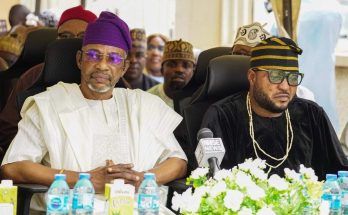I have followed with keen interest the ferocious frequency with which Nobel Laureate, Professor Wole Soyinka, has been attacking the late General SaniAbacha at the slightest opportunity that presents itself. His most recent outbursts of personal abuses and vilifications on the memory of Abacha followed the decision of the Jonathan administration to honour the late military Head of State with the country’s Centenary award along with other recipients across the country. Although the Jonathan administration gave valid reasons why Abacha was considered worthy of the award, Professor Soyinka still went ahead to launch a personal diatribe against the late military Head of State, calling him unprintable names. Of course, Soyinka was entitled to his opinion, but that freedom should be exercised with wisdom, maturity and sobriety.
Street language is below the dignity of a distinguished national figure like Soyinka. Just because you can write doesn’t give you the absolute freedom to breach the boundary of courtesy and abuse any perceived enemy with reckless abandon. This wasn’t the first time Soyinka devoted malevolent energy to ferociously launch personal abuses on the memory of Abacha. The late Head of State is dead to defend himself and, although his children had refused to join issues with Soyinka for 15 years until recently, their silence should not be mistaken for fear or weakness. Bullies feed on our passivity; our silence or inability to react encourages them to attack with increasing ferocity. When a man throws caution to the winds, then he should expect his victim to eventually react.
When you push anybody at bay, he may reach a point to confront you boldly to defend himself. And that precisely appears to be what SadiqAbacha did when he jumped into the ring to confront an implacable enemy old enough to be his father or grandfather.
Soyinka had the right to reject his own centenary award, but he should not launch scathing attack on Abacha. The professor described Abacha as “a thief of no redeeming virtues” and obviously this was not a fair assessment of Abacha. Abacha ruled 160 million citizens and I wonder how Soyinka’s opinion, which is influenced by personal hatred, would be a yardstick to objectively assess the General’s record.
The federal government was wise enough to adduce valid reasons why it gave Abacha the award. In fact, even the Nobel Laureate would not have faulted those reasons based on objective assessment of Abacha’s record in office. I don’t want to belabour the point by repeating those reasons, because Abacha’s performance record is well known to Nigerians. Why does Soyinka hate Abacha with such implacable passion? The only reasonable explanation was the June 12 political crisis of 1993, following the cancellation of the presidential election results, which late Chief MoshoodAbiola of the defunct Social Democratic Party (SDP), was presumed to have won.
Although Abacha didn’t annul the election, he found himself inheriting the repercussions of the political crisis. With the Interim National Government, then led by Chief Ernest Shonekan, clearly incapacitated to deal with the daunting political challenge, Abacha emerged Head of State after the coup d’etat against Shonekan.Shonekan was ousted after a Lagos High Court declared his government illegal, the first time in our political history that a government was formally declared illegitimate by a court order. Who killed Abiola? The death Abiola was the saddest and ugliest outcome of the June 12 political crisis. Could Abiola have survived? Was his death avoidable? Did Abacha kill Abiola?
Instead of addressing these critical questions arising from the June 12 political crisis, Soyinka always conveniently deviate iinto personal attacks on Abacha’s memory. Abiola died an avoidable death on account of the excessive idealism and naivety of the June 12 political warriors like Soyinka.
In 1995, Abacha had extended a bail offer to Abiola, but the June 12 warriors like Soyinka deceived Abiola into rejecting the bail offer. Abiola’s eldest son, Kola, was so angry at this naivety that he went to court to stop Chief G.O.K. Ajayi from representing his father any longer over the case.
He fell out with Abiola’s wife, Kudirat, over the naïve decision to reject Abacha’s bail offer. But for the naivety of the June 12 warriors, Abiola could have regained his freedom and avoided death in prison. Abacha had no intention of re-arresting Abiola after accepting his bail. Instead of seeking a political settlement of Abiola’s detention, the June 12 advocates like Soyinka were dealing with the case academically against political realities on the ground. Abiola died on account of the naivety of the June 12 advocates. Soyinka and other June 12 advocates should confront their conscience over Abiola’s death instead of diverting attention from their own role in his avoidable death.
Bakori wrote from Katsina Road, Kaduna. E-mail: yusufunijiyawabakori@yahoo



